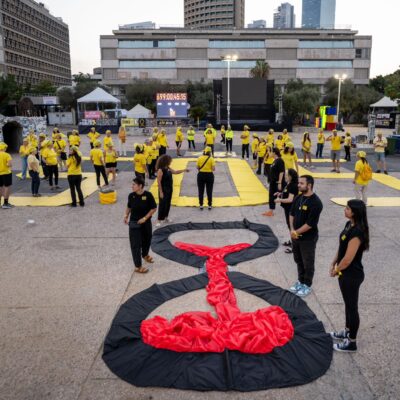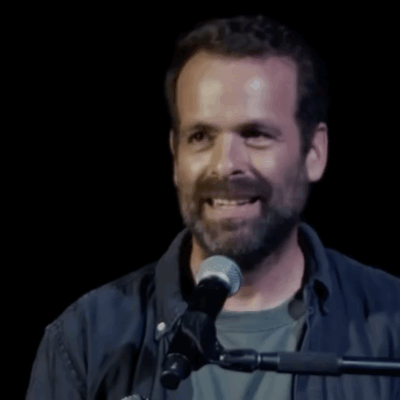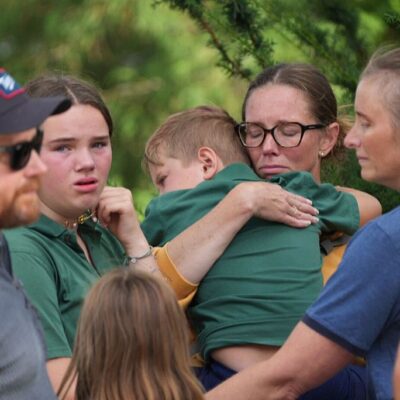Your Daily Phil: URJ gathers in D.C. to fete 150th anniversary
Good Tuesday morning.
In today’s edition of Your Daily Phil, we report on Birthright Israel restarting its trips next month and how Jewish groups are opting to engage with universities’ diversity, equity and inclusion frameworks rather than try to end them. We feature an opinion piece by Yossi Prager questioning the narrative of the philanthropic response to Oct. 7. Also in this newsletter: Pennsylvania Gov. Josh Shapiro, Larry Kramer and Natan Sharansky. We’ll start with the Union for Reform Judaism’s conference this weekend.
As nearly 1,000 members of the Reform movement — the largest Jewish denomination in the U.S. — gathered over the weekend at the Marriott Marquis in Washington, D.C., to mark the Union for Reform Judaism’s 150th anniversary, the three-day celebration also unintentionally highlighted a rift among liberal Jews about how to respond to Israel’s war with Hamas and what it means to be a Zionist, reports eJewishPhilanthropy’s Haley Cohen.
Despite being held in the shadow of the Israel-Hamas war and a global spike in antisemitism, attendees and organizers said that the event’s tagline of “Reconnect. Rejoice. Recommit” still mostly held true.
“The war was definitely present, but I didn’t feel like that was overarching. There was a lot of joy about celebrating the history of our movement while also looking to the future,” Sean Blum, 38, a URJ North America executive board member, told eJP.
But while the divisions within the movement over Israel may not have been the focus of the gathering, they certainly were present. On Saturday, more than 1,000 current and former Reform members, many of whom are active members or were previously leaders of the movement, published a letter calling for an immediate ceasefire in the Israel-Hamas war. “The URJ teaches practicing Pikuach Nefesh, ‘saving a life,’ and Tikkun Olam, ‘repairing the world.’ An immediate ceasefire is in line with these Jewish values,” the letter says.
Rabbi Rick Jacobs, URJ president, noted that young Americans are particularly grappling with the issue, something he addressed in a d’var Torah on Saturday. “The overwhelming feeling was one of Zionist solidarity and also willingness to think about younger people who had a different experience of Israel,” he told eJP after the conference. “They grew up in a time where they may not have been able to forge the kind of bonds that their parents and grandparents had but we are doubling down on the way Israel will be experienced.”
Jacobs emphasized that the Reform movement does not call for a ceasefire now “while Hamas has the ability to do another attack.”
Steven Windmueller, a professor emeritus at the Hebrew Union College-Jewish Institute of Religion in Los Angeles, echoed that there is a “challenge among younger American Jews struggling with the conflicts that they have over a different set of values or perspectives in relation to humanitarian aid and a ceasefire, in contrast to older American Jews who have a deep tie to Israel’s security and ability to protect and defend itself.”
BUSES ARE BACK
Birthright to restart trips next month, but at a fraction of its normal capacity

Birthright Israel announced that it will restart its trips beginning the first week of January, after halting its tours because of the ongoing Israel-Hamas war, albeit with far fewer participants than it would normally have for its winter trips, reports eJewishPhilanthropy’s Judah Ari Gross.
Hundreds, not thousands: For the first time in its history, Birthright halted its trips to Israel in November and December in light of the war, but said that it planned to restart them in the beginning of 2025, as was first reported by eJP. The organization said it anticipates that 350 people will take part in its trips beginning Jan. 5, though this is down from a normal rate of several thousand for that month. The organization said a “few hundred more” are expected to come through March 2024.
Safety first: The organization said the trips will “operate under strict safety and security standards” set by the Israeli military and participants will go through a pre-trip orientation. “Birthright Israel is committed to providing participants with a safe and a meaningful experience, which they might need now more than ever,” it said.
More than tourism: “Alongside a fun and meaningful experience, we want our participants to understand what happened on Oct. 7 and gain meaningful insight on how the events affected Israeli society and Jewish communities around,” Birthright Israel CEO Gidi Mark said in a statement.
WITHIN THE SYSTEM
Jewish communal leaders still committed to DEI framework, despite criticism

The diversity, equity and inclusion (DEI) bureaucracy at colleges has come under renewed scrutiny in the wake of a House hearing on campus antisemitism, which underscored how programs designed to promote inclusion have failed to address the rising anti-Jewish hate on campuses — and in some cases perpetuate it. Yet leading Jewish communal organizations say they still prefer to work within that system — urging universities to better incorporate Jews into an oppressor-oppressed hierarchy, instead of calling on them to dismantle the ideology behind it altogether, eJewishPhilanthropy’s Haley Cohen reports for Jewish Insider.
Rules of engagement: Leaders from the American Jewish Committee and Anti-Defamation League told JI their organizations are taking the engage-and-influence approach — and had been doing so well before Oct. 7. “I wouldn’t use the word ‘confront’ to describe what we’re going to be doing,” said Sara Coodin, AJC’s director of academic affairs. “We engage pretty regularly and partner with universities to work on education programs that can have the kinds of results we are looking for, more inclusion for Jewish students. We tend not to take an overly divisive approach when it comes to DEI.”
Reaching the goal: Adam Neufeld, senior vice president and chief impact officer at the ADL, echoed a similar approach. “We’ve been engaging universities, including DEI offices, for several years [about] the exclusion of antisemitism,” he said. “Our goal is to ensure that campuses are free of antisemitism. We just care about the results and there are many ways of reaching that goal.”
Read the full story here and sign up for Jewish Insider’s Daily Kickoff here.
THE BIG PICTURE
The real philanthropy success story

“The most important role of philanthropy is not in the moment of crisis. It is in the generation of ideas and the creation of structures that serve the community under ‘normal’ circumstances and can be ramped-up to meet the needs of a crisis situation as well,” writes Yossi Prager, the senior managing director of JFN Consulting, in an opinion piece for eJewishPhilanthropy.
Laying the groundwork: “In Israel, the response on the ground [after Oct. 7] was driven in large part by nonprofit organizations such as IsraAid and NATAL, whose capacity was also built over time by prescient funders. These organizations rose to the occasion in a dramatically impactful way because of groundwork laid over many years. Similarly, the strength of the North American response is primarily attributable to structures and institutions set up long before the crisis materialized… The response to antisemitism on campus is likewise attributable to investments made by the philanthropic community well before the post-Oct. 7 surge.”
Worthy Reads
Charity vs. Philanthropy: In the Jerusalem Post, Tali Yariv-Mashal encourages funders focused on aiding Israel post-Oct. 7 to distinguish between feel-good “quick fixes” and contributions with long-term value. “The natural tendency to give charity to those who have lost so much is commendable. Many will continue to donate privately, participate in crowdfunding, and volunteer to address all the basic necessities. These efforts bring us closer together and boost our individual and social health. However, philanthropy has a miracle-making advantage. It can produce long-lasting effects by rebuilding the educational, healthcare, and economic domains of the communities that were so severely damaged. It can define long-term goals and identify the professionals and civic organizations that can carry out strategies independently of short-sighted political influences. Philanthropy can advocate for dialogue between NGOs that have gained experience and understanding of the needs and concerns of communities. Philanthropic investments can also give government officials precious time to think, reorganize, and learn from the experience gained by civic activity during the crisis.” [JPost]
Balancing Trust and Due Diligence: In City Journal, James Piereson and Naomi Schaefer Riley critique the “trust-based philanthropy” movement. “According to a recent article in The Chronicle of Philanthropy co-authored by the head of Girls Inc. and the vice president for programs at the Ford Foundation, donors should consider giving more ‘multi-year, unrestricted operating grants’ because such giving is ‘crucial for nonprofits, especially startups, those serving marginalized communities and those led by people of color’… In this view, demanding benchmarks for success or performing due diligence have become passé, or even a sign of structural racism; the often-white donors should simply trust leaders of color to make decisions for themselves… Those working for foundations do not have to be told to listen to the people applying for funds. Reading proposals, raising questions, and meeting with grantees and applicants are all part of the job already. The new movement in philanthropy seems to want something more: to permit applicants to make decisions about their own grants, and to turn those interactions with foundation staff into a negotiating process, blurring the line between donors and recipients. This is unlikely to work as a general principle because too many groups are applying for funds to give them all a role in donor deliberations. By and large, donors work out relationships with grantee organizations over time, learning which ones to trust, which to monitor closely, and which to turn away.” [CityJournal]
Around the Web
A study released today by the Jewish Council for Public Affairs and More In Common found that Americans’ concern about antisemitism as a “somewhat” or “very serious problem” has increased from 62% to 78% since Oct. 7. It also found that the partisan gap on the issue has been virtually eliminated since the attack, with Democrats increasing their level of concern by 10 points to 83% and Republicans increasing their concern by 25 points to 81%…
Pennsylvania Gov. Josh Shapiro came out unequivocally in support of Israel at a virtual event hosted by the Jewish Democratic Council of America last week, saying the country “not only has a right to defend itself, I think Israel has a responsibility to combat Hamas head-on and to defeat Hamas”…
The Associated Press interviewed Larry Kramer about his more than 15-year tenure as president of the William and Flora Hewlett Foundation…
The Conference of Presidents of Major American Jewish Organizations launched a $240,000 ad campaign to combat antisemitism…
The Wall Street Journal spotlighted Kibbutz Be’eri, one of the hardest hit communities in the Oct. 7 attacks, whose population was decimated, as its remaining members consider how to rebuild their homes and lives…
The estate of George and Helene Ettelson donated $13 million to the Oregon Health & Science University to support cancer and dermatology research in honor of George’s father, Dr. Jesse Ettelson, a former leader in the Portland, Ore., Jewish community and dermatologist…
Amid ongoing donation efforts for Israel Defense Forces soldiers, the Israeli Military Rabbinate issued an order to troops not to accept religious items — tefilin, tzitzit, Torah scrolls, mezuzot, etc. — as gifts without its approval to “ensure that the equipment donated is acceptable according to halakha”…
Twenty-seven former leaders of Jewish communal organizations, including the Conference of Presidents, UJA-Federation of New York and AIPAC, sent a letter to President Joe Biden encouraging him to pursue peace negotiations toward a two-state solution following the Israel-Hamas war…
United Hatzalah hosted a charity concert at the United Palace in New York City over the weekend, raising $250,000, with performances by Ishay Ribo, Avraham Fried and others…
The New York Times profiled Curt Bloch, a German Jew who created 95 issues of a magazine while hiding from the Nazis during World War II…
Natan Sharansky warns Jews against partnering with people who have adopted an ideology that “divides the world into oppressors and oppressed, and assumes that moral righteousness always lies with the latter”…
Pic of the Day

Long Beach Police Commissioner Ronald Walsh Jr. (left) and Rabbi Benny Berlin of the BACH Jewish Center, one of Long Island’s oldest synagogues, chat as others help themselves to bagels, egg salad, baked goods and more at a thank-you breakfast organized by the BACH community at the Long Beach Police Department headquarters.
Birthdays

Founder and CEO of MyHeritage, Gilad Japhet…
Co-chair of the Democratic Majority for Israel, she was the communications director in the Clinton administration, Ann Frank Lewis… Journalist and playwright, he worked as a foreign correspondent for the New York Times based in Saigon, London, Nairobi and New Delhi, Bernard Weinraub… New York City-based real estate investor, he is the developer of four of Manhattan’s tallest towers in recent decades, Douglas Durst.. Ardsley, N.Y., resident, Ruth Wolff… Israeli computer scientist and high-tech entrepreneur, she is a technical director at Google Cloud, Orna Berry… Town justice in Ulster, N.Y. and a past president of Congregation Ahavath Israel, Marsha Weiss… Host of RealTalk MS Podcast, Jon Strum… SVP at the Steinhardt Foundation for Jewish Life, Eli Schaap… CFO at wine importer and distributor, New York Wine Warehouse, Jane Hausman-Troy… U.S. senator (R-OH) from 2011 until this past January, Rob Portman… British cellist, distinguished for his diverse repertoire and distinctive sound, Steven Isserlis… Author of 25 best-selling thriller and espionage novels whose main protagonist is an Israeli intelligence officer, Daniel Silva… Member of the Knesset for the Meretz party until 2022, Moshe “Mossi” Raz… President and chief creative officer of Rachel G Events, Rachel L. Glazer… VP and head of federal government relations at American Express, Amy Best Weiss… Acclaimed actor, his mother is Jewish, he reports that on his 13th birthday he performed a “bar-mitzvah-like act without the typical trappings,” Jake Gyllenhaal… Film and television actress, Marla Sokoloff… Deputy Washington bureau chief for The Boston Globe, Tal Kopan… Head of community programs at LinkedIn, Callie Schweitzer… Co-founder and CIO of Apeiros, Aaron Rosenson… Actress, best known for her role in Amazon Prime’s “Sneaky Pete,” Libe Alexandra Barer… Member of the Minnesota State Senate, Julia Coleman… MBA candidate at the Kellogg School of Management at Northwestern University, Haim Engelman… Founding partner of Puck, Theodore Schleifer… Freshman at the University of Chicago, Sarah Wagman… and her brother, Daniel Wagman… David Ginsberg…









